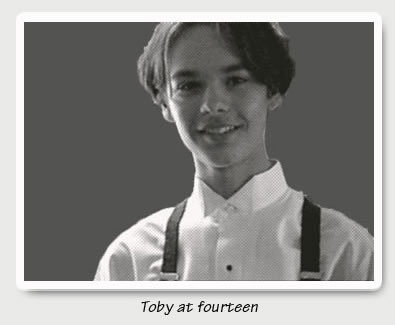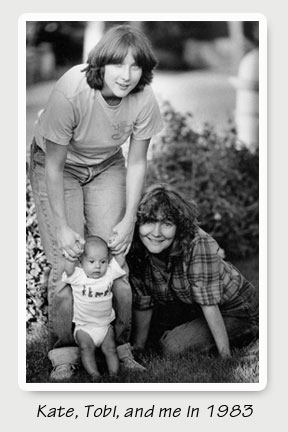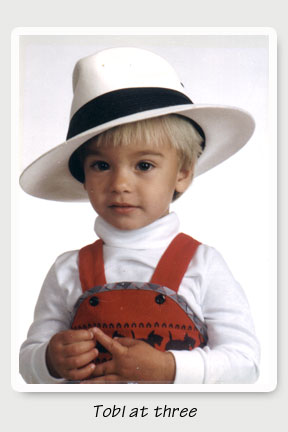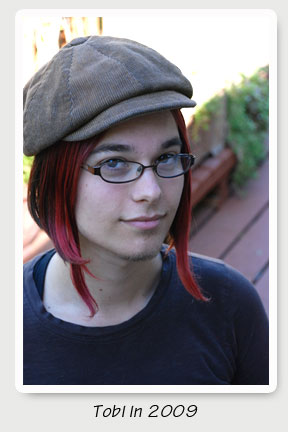A Public Embrace
The following piece was printed in the Eugene newspaper during a time of much controversy about a local non-discrimination bill that included transgender orientation.
With all the controversy over human rights these days, it’s time for me to get off of the sidelines and come out of the closet. Not as a lesbian this time (I’ve done that for decades), but as the mother of a transgender daughter.
 Tobi was 20 when she first explained to my partner, Kate, and me that she was questioning her gender. She wasn’t sure of much, except that she could no longer be the boy we had raised and would appreciate it if we would use female pronouns when referring to her. A request that had me stammering every time I talked about my child in third person. Tobi was 20 when she first explained to my partner, Kate, and me that she was questioning her gender. She wasn’t sure of much, except that she could no longer be the boy we had raised and would appreciate it if we would use female pronouns when referring to her. A request that had me stammering every time I talked about my child in third person.
Two years later, Tobi now considers herself a “transwoman.” She’s on a regimen of female hormones and has legally changed her name from Tobias to Tobi. I still have a hard time referring to her as anything other than “he,” even when people ask who my daughter is. She was my son, after all, for twenty years.
You might think it would be easier, as a lesbian already on the fringe of society, to embrace my child’s differentness. Kate and I do celebrate both our kids’ unique personalities, have always encouraged them to question the status quo and not to hesitate to be themselves at all times. Yet as lesbian mothers on the forefront of the “turkey-baster age,” our parenting is often scrutinized.  Foes and peers alike are eager to hold up our family – and others like it – as point-provers. We strive to be evidence for the side that says, “See? Kids with two moms are just as normal as everyone else’s.” Not for the side proclaiming that the lack of a male role model causes gender-confusion and homosexuality (even though most transgender or gay people have heterosexual parents). Foes and peers alike are eager to hold up our family – and others like it – as point-provers. We strive to be evidence for the side that says, “See? Kids with two moms are just as normal as everyone else’s.” Not for the side proclaiming that the lack of a male role model causes gender-confusion and homosexuality (even though most transgender or gay people have heterosexual parents).
As important as it was for us to affirm ourselves as an average American family, we also felt it was our duty to counteract gender stereotyping. To raise our boys to value emotion and sensitivity, to avoid the honing of aggression and assertiveness that is usually imposed on male children. As babies, they wore lavender and pink as much as blue, and as a toddler, when Toby chose pink high-tops and nail polish, we hesitated only a little.
So now, as my very outspoken first-born takes a stand – everywhere from City Council meetings to the national media – I can’t help but cringe a bit. The confidence that always kept outside criticism at bay sometimes wavers, and doubts creep in. Did we cause this?
I find myself swallowing a lot of words. The exact words I fended from my own mother when I so joyously proclaimed my lesbianism to the world. Do you have to be so public? You’re a walking target for hate-mongers. Just don’t say anything about it to Grandma; she’d never understand. Don’t tell me you’re wearing that. Surely this whole thing is a rebellious phase. You could feel differently in a few years, so don’t lock yourself into anything you can’t get out of.
 I don’t actually say these things, because every time I hear them in my head, I remember what it felt like to have my mother say them to me. How she changed the subject whenever I made reference to a girlfriend or lover. Insisted I hide my pregnancy from my grandmother until the very last minute, because “it would kill her.” Introduced Kate as my roommate to her friends. Begged me to wear a dress to my sister’s wedding. I don’t actually say these things, because every time I hear them in my head, I remember what it felt like to have my mother say them to me. How she changed the subject whenever I made reference to a girlfriend or lover. Insisted I hide my pregnancy from my grandmother until the very last minute, because “it would kill her.” Introduced Kate as my roommate to her friends. Begged me to wear a dress to my sister’s wedding.
I swore I would never be like that with my own children, and I do what I can to shed the shame and concern about what others think. But the worry sticks, with good reason. Transgender people face heightened discrimination in employment, housing, and access to public services and health care. Not to mention a pervasive negative attitude from the general public. But my deepest fears concern violence. A 1997 report published by the National Center for Lesbian Rights shows that 37% of male-to-female transgender people reported having been victims of violence related to their gender presentation. Although the FBI doesn’t include gender identity as criteria for a hate crime, statistics compiled by the Gender Public Advocacy Coalition show at least one transgender person is murdered in this country each month. What is it about blurred gender boundaries that incites such rage in people? I commend Tobi’s courage and activism, but as a mother, I can barely bring myself to look at these statistics.
 Tobi is not the son I thought I had, and not exactly the daughter I dreamed of either. But underneath it all, the essence of Tobi is unchanged. Tobi is still the child I’ve always known and loved. Incredibly smart and articulate, empathetic, and creative. The lopsided smile is still there. The deep, brown eyes. The warmth. This is the Tobi I want the world to know, regardless of gender presentation. Tobi is finding her own way in a skeptical society, not afraid to be whoever she is. I’m proud of her, and if the lack of closet doors in our family has made it possible for her to stretch her search for self further than most, then I am glad for it. Tobi is not the son I thought I had, and not exactly the daughter I dreamed of either. But underneath it all, the essence of Tobi is unchanged. Tobi is still the child I’ve always known and loved. Incredibly smart and articulate, empathetic, and creative. The lopsided smile is still there. The deep, brown eyes. The warmth. This is the Tobi I want the world to know, regardless of gender presentation. Tobi is finding her own way in a skeptical society, not afraid to be whoever she is. I’m proud of her, and if the lack of closet doors in our family has made it possible for her to stretch her search for self further than most, then I am glad for it.
When the kids were little, Kate and I put ourselves out there in the world – in newspaper articles, on gay and lesbian panels, to other mothers on park benches. Stroller activists, we called ourselves, and we wanted nothing more than to be seen as who we were: a couple of women who loved each other, raising our kids the best we could. We hoped to break down some of the fear and prejudice that causes division in communities, and we longed for acceptance. For the most part, we’ve found it. I long for nothing less for the children we’ve raised.
Twenty-two years ago, I went into labor at a Sweet Honey in the Rock concert. As they sang their soulful a cappella rendition of Kahlil Gibran’s famous poem, my uterus tensed with imminent release.
Your children are not your children.
They are the sons and daughters
of Life's longing for itself.
They come through you but not from you,
And though they are with you
They belong not to you
You may give them your love but
not your thoughts,
For they have their own thoughts.
You may house their bodies but
not their souls,
For their souls dwell in the
house of tomorrow,
which you cannot visit,
not even in your dreams…
I believed this song and sang along with conviction. My arms tingled with goosebumps and my belly contracted in agreement. The words humbled my sense of mother-magnitude and reminded me that I only played a part in this impending event. I was something more than vessel, less than creator.
Tobi is not here to prove that lesbians can be good parents. She’s here to make her own mark on this world. Just as Kate and I rode the crest of the Gay and Lesbian movement in the 70s and 80s, Tobi is forging new paths in the frontiers of gender and sexuality. If she raises a few eyebrows in the process, and if some of those raised eyebrows are directed at Kate and at me, that’s just as well. Because we are a family of eyebrow levitators. And for every crinkled brow, a mind may be expanded, even if just a little.
© Jennifer Meyer. To reprint, please
ask for permission.
Back to Essays
|